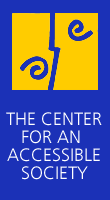
INFORMATION
FOR JOURNALISTS
TOPICS
ABOUT
THE CENTER
On Feb. 1, 2001, Pres. George W. Bush proposed to triple funding for the nation's 15 Rehabilitation Engineering Research Centers -- from $11 million to $33 million -- to help bring assistive technologies to market and "better coordinate the federal effort in prioritizing immediate assistive and universally designed technology needs in the disability community." Technology -- computers and computer-driven devices like voice output -- are a true way to "level the playing field" for people with disabilities; with the right technology, quadriplegics can operate computers with the glance of an eye. Yet computer usage and Internet access for people with disabilities is half that of people without disabilities according to the Disability Statistics Center.
The National Institute on Disability and Rehabilitation Research funds 15 Rehabilitation Engineering Research Centers across the nation.
Wheelchair racers using the newest sports wheelchairs can complete races longer than 800 meters at speeds faster than those of Olympic runners because of new materials developed from rehabilitation engineering research at places like the RERC on Wheeled Mobility. Runners using prosthetic legs (see the RERC in Prosthetics and Orthotics) repeatedly have demonstrated impressive speeds. In everyday life, people who use wheelchairs have benefited from lightweight, transportable chairs as well as powered chairs that greatly increase the independence of some users.
Data from the 1990 Census showed that over 15 million people in the U. S. had a "functional limitation" in performing activities such as seeing, hearing, reaching, or walking. Census researchers say over half of all Americans over 70 years old have a disability. Older people using wheelchairs often don't have the muscle strength to propel them, or to transfer out of them. Rehabilitation engineering programs like the RERC on Aging
work to come up with solutions for older people who acquire disabilities, including "assistive technology."
Talking signs, infrared hearing systems and video description are all the result of rehabilitation engineering projects.
Over two million of us, of all ages, have problems with communicating, sometimes due to a stroke. Thanks to rehabilitation engineering, today there are over 40 U.S. firms developing, manufacturing and distributing "augmentative communication devices." A rehabilitation engineering center can offer potential manufacturers a well-researched device prospectus based on universal design principles, showing how the product can be used by a wide range of people.
It's estimated that over 20 million people in the U.S. can benefit from hearing aids; rehabilitation engineering developments over the past five years from centers such as the RERC on Hearing Enhancement have resulted in significant growth in digital hearing aid technology, improved evaluation of hearing loss (especially in very young children); improved computer-assisted fitting of hearing aids and more cosmetically acceptable hearing aids
Locating the bus stop, the subway entrance, ticket vending machine, telephone and the bathroom can be a real problem for people who are losing their vision. The Smith-Kettlewell RERC develops techniques for orientation and mobility for people with vision difficulties.
The authority for Rehabilitation Research Engineering Centers is contained in section 204(b)(3) of the Rehabilitation Act of 1973, as amended (29 U.S.C. 762(b)(3)).
More about RERCs from National Center for the Dissemination of Disability Research
EXPERTS IN technology:
Kate Vanderheiden
Steve Jacobs
The Federal Communications Commission's Disability Rights Office website at http://www.fcc.gov/cib/dro/ provides much background information on technology access.
RERC on Aging
Contact information for RERCs
http://wings.buffalo.edu/ot/cat/rerca.htm
RERC on Technology for Children with Orthopedic Disabilities
http://www.ranchorep.org/projects.html
RERC on Communication Enhancement
http://www.aac rerc.com/
RERC for Ergonomic Solutions for Employment
http://www.engin.umich.edu/dept/ioe/RERC/RERC.html
RERC on Hearing Enhancement
http://www.hearingresearch.org/
RERC: Improved Technology Access for Land Mine Survivors
http://www.banmines.org/
RERC on Information Technology Access
http://trace.wisc.edu/itrerc
Smith-Kettlewell RERC
http://www.ski.org/Rehab/
RERC in Prosthetics and Orthotics
http://www.repoc.nwu.edu/
RERC on Technology Transfer
http://wings.buffalo.edu/ot/cat/
RERC on Telecommunication Access
http://trace.wisc.edu/telrerc
RERC on Telerehabilitation
http://www.hctr.be.cua.edu/RERC/
RERC on Universal Design and the Built Environment at Buffalo
http://www.ap.buffalo.edu/~idea/
RERC on Universal Design and the Built Environment at North Carolina
http://www.design.ncsu.edu:8120/cud/proj_services/projects/nidrr_rerc.htm
RERC on Wheeled Mobility
http://www.rerc.pitt.edu/
Trace Research and Development Center
at the University of Wisconsin/Madison
Senior Technology Consultant with the NCR Corporation in Dayton, is an expert in information technology access and has served on the U.S. Electronic and Information Technology Access Advisory Committee and the U.S. Telecommunications Access Advisory Committee.
Reach him at NCR Corporation:
Voice (937) 445-6396
Fax (937) 445-2468
TTY (800) 855-2880
email:
steve.jacobs@daytonoh.ncr.com
OTHER SITES OF INTEREST:
The following sites contain information that may be of interest. Please bear in mind that the information at these sites is not controlled by the Center for An Accessible society. Links to these sites do not imply that the Center supports either the organizations or the views presented.
http://www.assistivetech.net/,
created by Georgia Tech's Center for Rehabilitation Technology and its partners and funded by the U.S. Department of Education's National Institute on Disability and Rehabilitation Research (NIDRR) to provide information to incrase access to assistive technology devices, services and other disability-related resources.
Links to Rehabilitation Engineering Research Centers